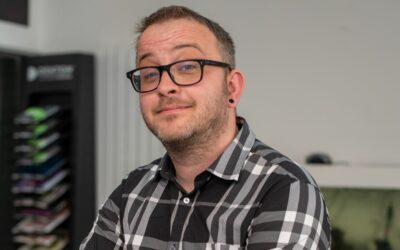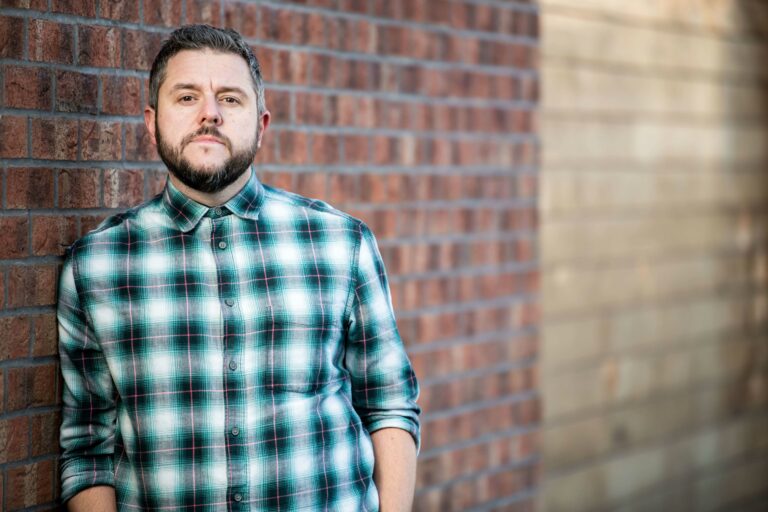Lee Benecke is digital strategy director at award-winning brand communications agency Manifest Group.
Prior to joining Manifest Group in 2020, he was business director for two years at Wavemaker, head of social media at Brazen and head of social media for Delete.
Alongside Justin Clark he co-founded SocialNorth, a marketing networking and conference event designed to connect the North’s digital community. Since launching last year, the conference has had a range of insightful speakers from British Vogue to the UN.
From a stint in music journalism, moving on to music PR and then copywriting, he shared his career journey, tips and advice…
How did you first get into your industry?
I fell. Headfirst. After university, I had one goal – be a music journalist. Nowt else. I was freelancing with a few magazines as well as holding down a full-time gig as Music Listings Editor at The Press Association and I was fully immersed in feature writing, interviews, reviews, editing the little gig blurbs in The Guardian Guide and Metro, and anything that would get me towards my goal.
As I did that, I found myself spending more time online discovering new music and chatting with labels, bands, fans, and publishers. I spent hours on Myspace (I know, I’m old) and, as well as continuously tweaking my Top 8, I was starting to understand how the site worked and how people were using this new thing called ‘social media’. My freelancing and PA gig hardly set my bank balance alight, so I decided to start a music PR side hustle on Myspace. I’d spent enough time around label PRs to see what they did, and I could certainly write and talk, so I started selling ‘professional’ press packs to unsigned bands.
Now, if you’re trying to make your millions, unsigned bands are NOT the market you want to target but as well as press releases, I started getting requests for help with Myspace, YouTube, Twitter, Facebook, and websites. With every request, I said yes and learnt what I needed to fulfil the ask. It led me to learn the foundations of social, search, content, PR, marketing and more, and I just never stopped.
The final step in making digital my actual career was when I ‘sold out’ and took a job as a copywriter. Alongside web copy, I also edited an in-house consumer technology magazine that was given free with all orders. Soon the magazine went south due to budgets, and I came up with the plan to migrate the magazine content into the website via blogs, forums, and social media. The idea was a good one but born from wanting to basically save my job. I worked with an amazing small team of designers, coders, and videographers to get it going. I then got deeper into product content, SEO content, brand social, and more, and found I loved it. I never looked back and I’m still here over 15 years later.
What do you love about your job?
I remember the first day I stepped into an agency. I was a client then but I looked around and couldn’t believe these people got to work on different brands every day. After they’d met me and my manager, they went off and did it again with another brand. They got to pitch new ideas, meet new people, and see under the hood of a thousand different brands and products. That fascinated me, and I’ve never lost that fascination.
It’s what I love about my job. The ability to be set and meet a new challenge every day. The opportunity to answer a brief, answer a difficult question, create change, or address a need in society or culture. How could you not love that? I love it because I am excited about all the challenges out there. There is no such thing as a boring brand or a boring brief. You just need to find that fascination to answer the challenge in an interesting way.
Who – or what – has inspired you in your career?
Two things: people’s endless creativity and the emotional intelligence of some amazing people I have met along the way. From a young age, I have been obsessed with creative things and creative people. My own creativity as a child was writing and drawing (and Lego building) and I was always on the lookout for new ways to express that. I wrote poems and short stories. I drew anything and everything and found myself endlessly bending the ears of my mum and dad for more paper, more paint, more pencils, and more stuff to try. It all went famously until I nearly gassed myself using spray paint in my bedroom. Oops.
I also sought creativity I didn’t have. As you can guess, I love music but I’ve never played a note. I was just a fan of the music, the dance, the characters, and the action in front of me. Same with books, comics, films, art, and everything. That was all pre-career but it’s the foundation for everything I’ve done ever since and I have the same attitude now. And then there has been the kindness of people. My parents were amazing in supporting my creative demands as a kid and I had a couple of teachers who actively supported my love of reading, writing, and drawing. That support gave me the confidence to pursue a creative career and then when I achieved that I have always thrived around emotionally intelligent people.
I really appreciate people who can lift people up and support their growth. I love when people can both put an arm around someone when needed but also know when a motivational kick them up the arse is needed instead. Both acts are a form of love and support and I’ve needed both as a I grew up in this industry. I also hope I have been able to give that in return for people I have worked with or managed over the years.
What are the biggest challenges about your job?
The speed of change has always been the biggest challenge in digital. We are all playing a game where the rules, the playing field, the people, and the tactics change every day. It’s one of the biggest opportunities in digital too but it’s tough when you’re saying this is my career, and somewhere I want to be for the next 10/15/20 years.
I remember saying this exact thing when I started and it’s fair to say a lot of what I knew then is completely different now. Although I could say the same for what we were doing just 18 months ago. That pace of change and constant evolution is always set against the backdrop of change in culture and society. People’s behaviours, perceptions, value systems, and changes in culture impact everything we do in digital. Flux is the only constant and you have to be comfortable with that challenge.
What skills have been the most crucial to you succeeding in your career so far?
The ability to stay positive, stay curious and never swallow my own (or anyone else’s) bullshit. Positivity is so powerful. I don’t mean blind positivity. That is ignorance. We need to accept and challenge everything around, but I do believe in the power of positivity. Especially when we’re talking about how we look after ourselves, our colleagues and our industry. Especially in giving us the resilience needed as well.
I find a lot of marketers not only live with a glass half empty, but the glass is cracked and the drink in the glass is wrong. I’ve already said positive people have impacted me greatly and I know it’s crucial in my career. Especially when I have encountered people, places and situations that could have really destroyed my positive outlook on this industry. Likewise, curiosity may seem cliché but it’s so important. If you’re curious, you’re open to the possibility of something amazing. I urge everyone to stay curious. As for swallowing bullshit, I think that is pretty self-explanatory.
I think coming from a working-class northern background has 100% given me a filter like no other. It’s funny because I will always remember going home to Bradford and being humbled in my local pub. I was only having one drink as I was going to the cinema, and I was talking to an old boy at the bar about this. As soon as the words left my mouth, he said “Cinema? Who are you, it’s the pictures round here lad”. When you’re being accused of gentrifying a trip to Cineworld then you know not to get ahead of yourself and let ego in.
What was your first salary and what could someone getting into the industry expect to earn nowadays?
My first salary was £12,000, and I would get a £1,000 pay rise every 12 months. Not a penny more. Not a day earlier. Kind of explains why I thought hawking press releases for extra pennies was a good idea. Nowadays, you’d obviously expect more.
I think you will find entry level salaries in the late teens/early twenties dependent on the role, the employer, and the way the wind is blowing that day. A lot is happening in the creative industries around pay parity and, although I think we’re a long way off parity, we must keep the conversation and action alive.
I am fortunate to work for a progressive change-focused agency as well as being part of amazing groups like Common People fighting for more action in industry. That fight will continue to address the issues around access and pay and lots more, and I really hope it will also see a profitable and sustainable future for people looking to find their career in marketing.
What education or training would be most useful for someone looking to follow your career path?
My career path has been predicated on the challenge of staying ahead of an ever-changing game and the curiosity to constantly seek out new ways to understand those changes. There is no formal training for that, but you can 100% seek out mentors or learning paths that allow you to meet the demands of industry and thrive within it.
I’d say read wide, don’t underestimate the impact of culture on the marketing output of brands and agencies, speak to different people about their views, and learn HOW something is done not just what it is. I think the most effective way to do all of this is by hands-on work experience. You will find a lot of free resources online when it comes to learning the tactics and practical demands of a platform or discipline so do seek them out too but don’t discredit the value of working to get ahead.
What advice would you have for someone looking to follow your path?
My path is fully grown over now. The role that social has on our lives and how we communicate just did not exist when I started out. Hard to believe now but there was a time where only a few of us took social media seriously enough to recognise it’s value. Now, our generations are so engrained in digital and we know, that by the time people get to job age, they are already armed with the knowledge of technology and platform use. That wasn’t my reality. However, the constant change I have talked about won’t go away so anyone looking to be in digital for the long haul will need to get used to that quickly. And that leads to my ultimate advice – don’t be afraid to do the work.
Time spent in the weeds, understanding how things work, and learning how small tactics can bend and shape real positive outcomes in digital is invaluable. Every act is a lesson and shapes your own view on how things work and how you think you can help brands and businesses understand it. That will always be the case too. As you get more experienced and promoted with fancier manager or director job titles, don’t lose that work ethic and curiosity to understand how things work. It will always be important.











